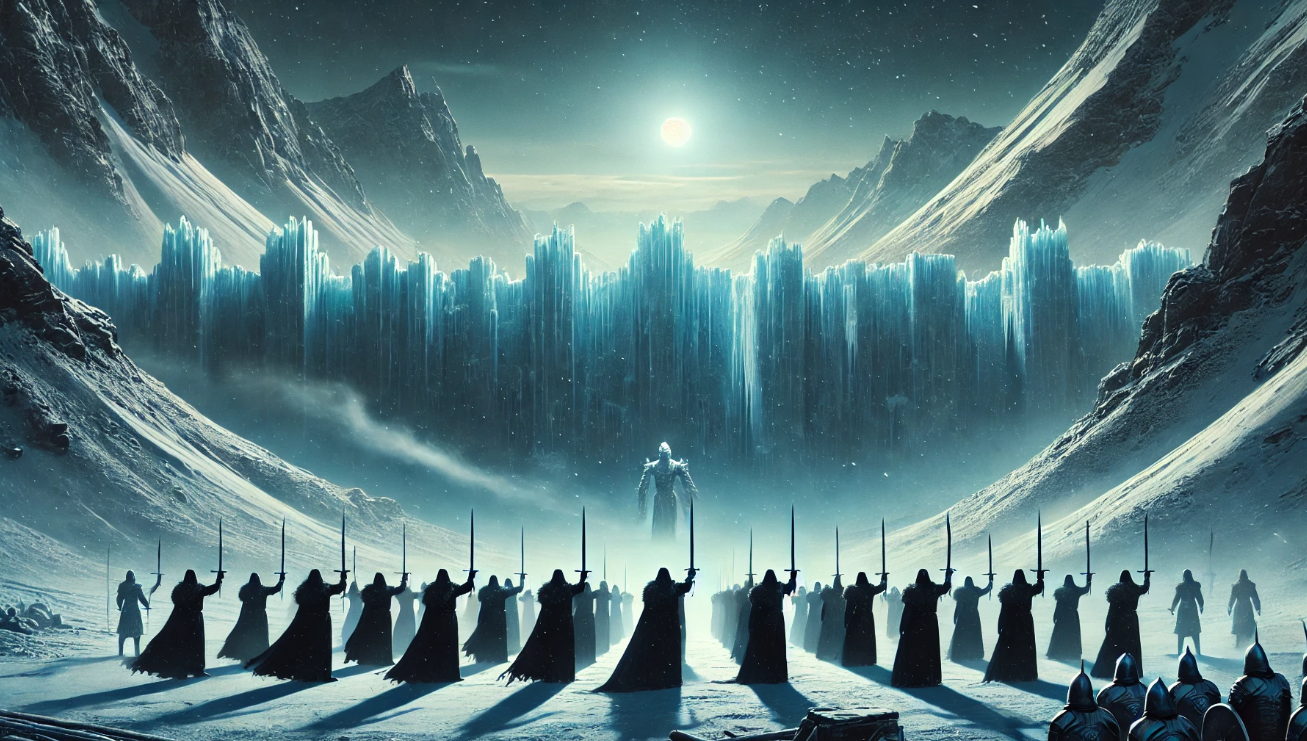
For thousands of years, a brotherhood clad in black has stood as the first and last line of defense against the darkness beyond the Wall. The history of the Night’s Watch is one of duty, sacrifice, and forgotten glory—etched into the icy winds of the North and the stones of Castle Black. Who were these sworn protectors, and what ancient threats forged their solemn vows? From legendary beginnings during the Age of Heroes to their decline in the shadow of indifference, the tale of the Night’s Watch is as haunting as it is heroic. Their story begins where the realm ends.
The Ancient Origins of the Night’s Watch
The Night’s Watch was founded over 8,000 years ago, shortly after the terrifying events of the Long Night. This period, marked by endless darkness and the rise of the White Walkers, threatened all of humanity. To ensure such a catastrophe never happened again, the leaders of the Seven Kingdoms established the Night’s Watch — a military order dedicated to guarding the Wall and protecting the realm from the dangers beyond.
The Wall itself, a massive structure made of ice and stone, was constructed to separate the known world from the terrifying wilderness in the far north. Its purpose was clear: keep the creatures of the dark — particularly the White Walkers — from reaching the people of Westeros.
The founding of the Night’s Watch wasn’t just about defending the Wall; it was about ensuring that the mistakes of the past were never repeated. Members of the Night’s Watch swore a sacred oath, pledging to forsake their former lives and dedicate themselves entirely to the Watch’s cause. This commitment was essential, as they had to be neutral, never involved in the politics or conflicts of Westeros. Their focus was solely on protecting the realm from the unseen threats in the north.
As the centuries passed, the Night’s Watch became a symbol of vigilance and sacrifice. Its members, often outcasts or those seeking redemption, embraced their role, though it was not without its hardships. Despite facing internal struggles, the Watch held strong, bound by the shared understanding of their crucial duty to the realm.
Thus, the ancient origins of the Night’s Watch are deeply intertwined with the fight against an ancient evil, laying the foundation for one of the most significant and enduring institutions in the Game of Thrones universe.
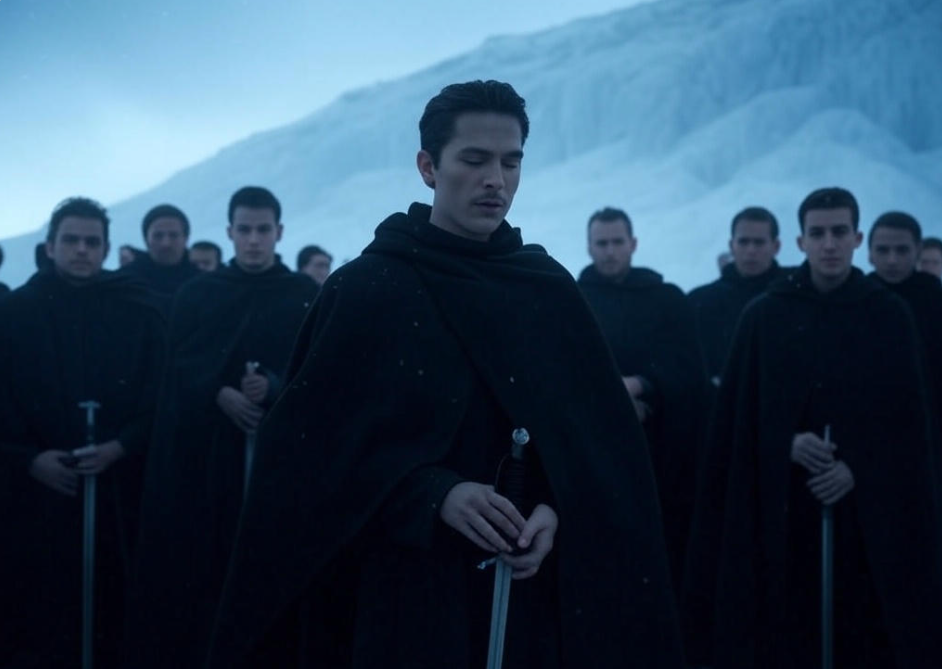
The Vows of the Night’s Watch
The vows of the Night’s Watch are central to understanding what it means to be a member of this sacred brotherhood. When a man takes the oath, he pledges to dedicate his life to the Watch, forsaking all personal ambitions, ties, and allegiances. The vows are simple but profound, reflecting the harsh reality of their duty.
The Night’s Watch Oath: The vow consists of three key promises:
“Night gathers, and now my watch begins.” — This marks the beginning of a lifelong commitment to the Watch, where a member swears to uphold his duty regardless of personal cost.
“I shall take no wife, hold no lands, father no children.” — This renouncement of personal ties ensures that a member is fully devoted to the Watch, with no distractions or loyalties outside the Wall.
“I shall wear no crowns and win no glory.” — This vow signifies the Watch’s role as protectors rather than conquerors. Glory is not for them; they serve in the shadows, unnoticed by the world.
“I shall live and die at my post.” — The commitment is a lifelong one, with members swearing to stay on the Wall until death, protecting the realm even at the cost of their own lives.
“I am the sword in the darkness.” — This symbolizes the Night’s Watch as a barrier between the darkness (the unknown threats beyond the Wall) and the safety of the Seven Kingdoms.
“I am the watcher on the walls.” — Members are literally the eyes and ears on the Wall, watching for dangers like the White Walkers and wildlings.
“I am the shield that guards the realms of men.” — This final vow emphasizes their primary mission: protecting the people of Westeros.
The Meaning Behind the Oath: The vows are not just words but a way of life. They force members to put aside personal desires for the greater good. The Watch is built on loyalty and sacrifice — every member understands that their role is essential for the survival of the realm. Even though they are isolated, the Night’s Watch is a brotherhood that transcends individual ambitions, focusing on one goal: guarding the Wall against whatever may come.
Why the Oath Matters: For the men of the Night’s Watch, the vow is a sacred promise that shapes their identity and drives their every action. It is what defines them as part of something larger than themselves, something that holds the line against darkness and chaos. The simplicity of the vow makes it easy to understand, yet its impact is immense.
By taking the oath, each member steps into a legacy of service and sacrifice, binding themselves to a duty that no one can escape. Whether it’s Jon Snow, Samwell Tarly, or any other member of the Watch, these vows are at the core of their identity, shaping their journeys in Game of Thrones.
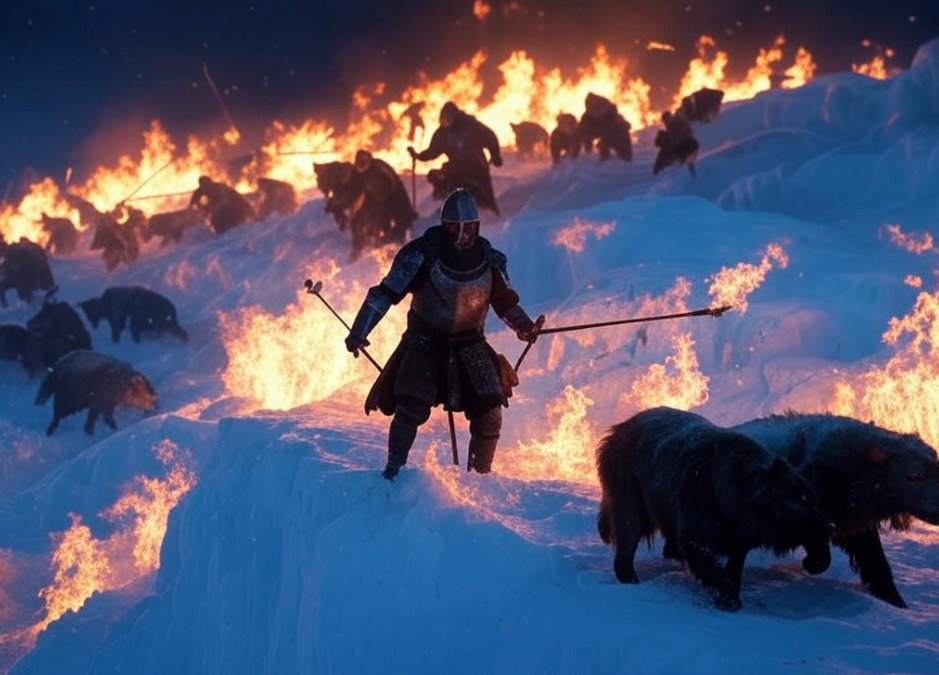
The Night’s Watch in the Game of Thrones TV Series
In Game of Thrones, the Night’s Watch plays a critical role, shaping key characters and plotlines. As the show’s central protector of the Wall, the Night’s Watch is a unique institution where personal ambition is sacrificed for the greater good. Let’s dive into how this group of outcasts, sworn brothers, and warriors fits into the larger story.
Key Characters of the Night’s Watch
Jon Snow: Perhaps the most iconic member, Jon Snow’s journey from an illegitimate Stark child to Lord Commander of the Night’s Watch is central to the Watch’s narrative. His leadership, moral compass, and eventual defection from the Watch illustrate the complexities of duty and personal freedom. Jon’s journey embodies the struggles of balancing personal desires with the overarching duty to protect Westeros.
Samwell Tarly: The unlikely hero, Sam provides comic relief but also critical wisdom. His friendship with Jon Snow and his growth into a scholar help guide the Watch in its fight against the White Walkers.
Lord Commander Mormont: The stern yet honorable leader in the earlier seasons, Mormont represents the old guard of the Night’s Watch, embodying the traditional values of service and sacrifice.
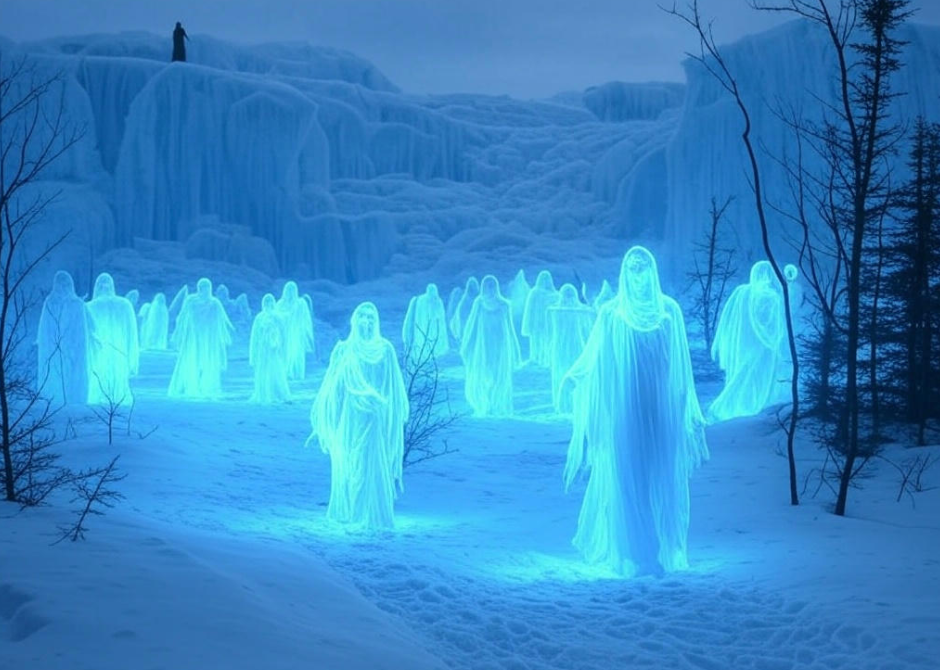
Key Events Involving the Night’s Watch
The Battle of Castle Black: This pivotal event marks a major clash between the Night’s Watch and the wildlings. Jon Snow and his brothers-in-arms defend the Wall from an overwhelming enemy force, showcasing the life-or-death stakes of their duty. This battle highlights the perilous role of the Night’s Watch and the sacrifices it requires.
The Wildling Invasion: As tensions rise between the wildlings and the Night’s Watch, the Watch becomes a focal point in the struggle between survival and the greater threat beyond the Wall. This conflict deepens the bond between the Watch members and sets the stage for their ultimate confrontation with the White Walkers.
The Watch’s Evolution Throughout the series, the Night’s Watch shifts from a noble but declining institution to an essential military force against the threat of the White Walkers. Early seasons focus on the Watch’s internal struggles — corruption, lack of resources, and the struggle to keep the Wall manned. However, as Jon Snow rises through the ranks, the Watch finds renewed purpose, especially when the threat of the White Walkers becomes undeniable.
The Night’s Watch and the Battle Against the Long Night As the series progresses, the Night’s Watch transforms from a ceremonial force to the frontline in the fight against the White Walkers. Jon Snow’s leadership and the Watch’s strategic importance grow, ultimately tying them into the larger conflict of the series. The Watch stands as a symbol of the fight against darkness — both literal and metaphorical — encapsulating the show’s themes of sacrifice, loyalty, and survival.
In summary, the Night’s Watch in Game of Thrones is more than just a group of men guarding a Wall. It’s an essential part of the series’ larger narrative, with its members facing not only external threats but their internal battles with honor, duty, and personal sacrifice. The Watch is a reflection of the show’s core themes, making it one of the most important elements in the fight for the future of Westeros.
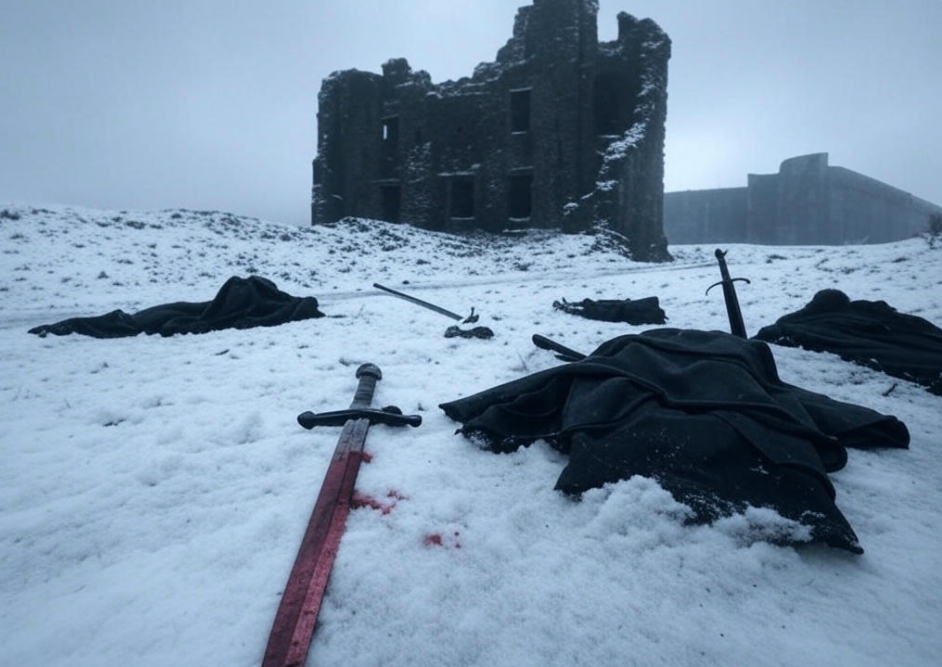
The Night’s Watch and the Long Night
The Night’s Watch was created to guard against an ancient evil that threatened Westeros — the White Walkers. Known as the Long Night, this dark period marked the first invasion of the creatures from beyond the Wall, bringing with them endless winter and death. The Wall was built not only as a physical barrier but as a defense against the return of this ancient terror.
The White Walkers’ Return For thousands of years, the White Walkers were forgotten legends, but their return becomes a central plotline in Game of Thrones. As the show progresses, it’s revealed that the true purpose of the Night’s Watch was not only to defend against wildlings but to guard against this existential threat. The return of the White Walkers signals the beginning of the Long Night, a second battle between the living and the dead.
The Wall’s Strategic Importance The Wall was the ultimate line of defense. Positioned at the edge of the known world, it was the Night’s Watch’s primary duty to ensure no White Walkers could cross. The Watch’s patrols, often seen as routine or mundane, are actually crucial in keeping watch for signs of the approaching army of the dead. The Night’s Watch, in its most basic form, represents humanity’s last defense against this apocalyptic threat.
Jon Snow and the Long Night Jon Snow’s role is pivotal. As the Night’s Watch faces the growing threat of the White Walkers, Jon rises to the challenge. His leadership during the invasion of wildlings and later as the Lord Commander of the Watch strengthens the connection between the Wall and the defense against the Long Night. Jon’s experience on the Wall prepares him for the battles to come, making him a key player in the final stand against the White Walkers.
Why It Matters The return of the Long Night and the White Walkers solidifies the purpose of the Night’s Watch in the Game of Thrones narrative. It’s not just a group of men watching a Wall — they are guardians of the last line of defense against an ancient evil. Their watch becomes more than a duty; it is a vital mission to protect all of humanity from extinction.
By understanding the Night’s Watch’s origins and their critical role during the Long Night, we see how this ancient institution is not just a part of the story — it’s essential to the survival of Westeros.
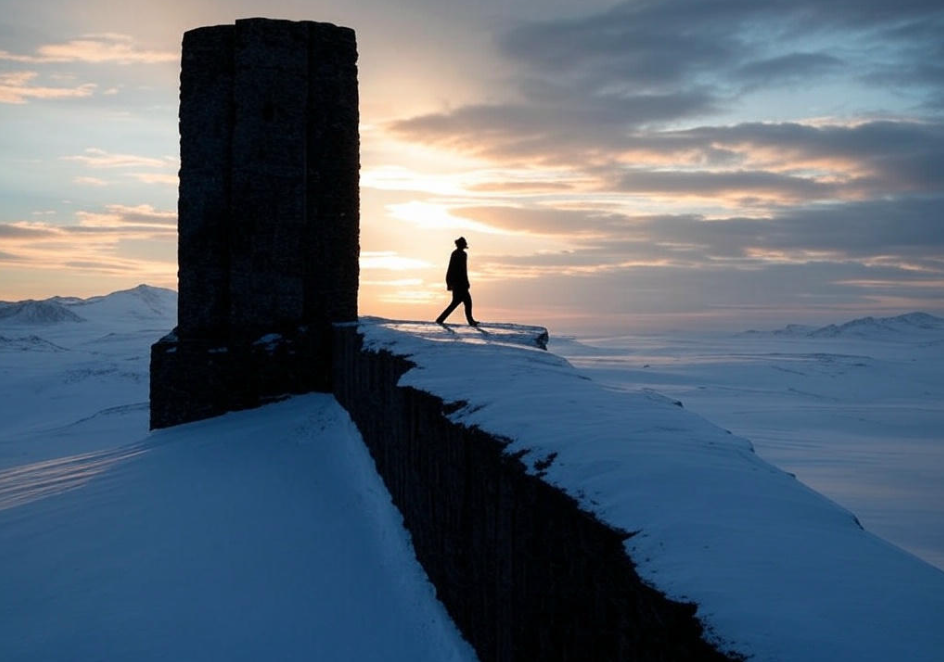
The Symbolism of the Night’s Watch
The Night’s Watch is rich with symbolism, representing key themes of Game of Thrones such as duty, sacrifice, and the constant battle between light and darkness. The Watch’s role and its values resonate deeply throughout the series, making it a powerful symbol in the narrative.
The Black Cloaks One of the most iconic symbols of the Night’s Watch is their black clothing. The color black represents the brotherhood’s neutrality and sacrifice. By wearing black, the members forgo any allegiance to their past lives or family ties, embracing the idea of total devotion to the Watch. It also symbolizes the constant shadow they live under, guarding against the dark forces that threaten Westeros.
The Wall The Wall itself is a symbol of protection, isolation, and sacrifice. It physically separates the civilized world from the untamed wilderness beyond, representing the line between safety and chaos. The Wall also stands as a reminder of the enduring commitment of the Night’s Watch — a massive structure built to protect humanity, but also isolating those who serve on it.
The Oath The vows taken by members of the Night’s Watch serve as another powerful symbol. These vows are about renunciation — giving up personal desires, ties, and ambitions for a higher cause. This reflects the idea of selflessness, emphasizing that the Watch’s mission is far greater than the individual. The oath symbolizes the ultimate commitment to the protection of the realm, no matter the cost.
The Brotherhood The Night’s Watch is often seen as a brotherhood, a community of men bound not by blood, but by shared purpose and sacrifice. This symbol of brotherhood underscores the idea of unity in the face of overwhelming darkness. It also represents the breaking down of social hierarchies, where men of all backgrounds — from noblemen to criminals — come together to serve a higher cause.
Light vs. Darkness Perhaps the most profound symbolism of the Night’s Watch lies in its role as the guardians against darkness. As the Wall stands against the frozen wilderness, the Night’s Watch represents humanity’s fight against the eternal night brought by the White Walkers. This battle between light and darkness is central to the series, with the Watch standing as a symbol of hope and survival against an overwhelming, dark force.
In essence, the symbolism of the Night’s Watch goes beyond just a group of men guarding a wall. It is about sacrifice, selflessness, and standing firm against the darkness — qualities that resonate with the larger themes of Game of Thrones and make the Watch one of the most powerful and enduring symbols in the series.
The Fall of the Night’s Watch
The fall of the Night’s Watch is a significant turning point in Game of Thrones, marking the decline of a once-powerful institution. Despite its noble origins and important role in defending Westeros, the Night’s Watch faces internal decay, corruption, and eventual betrayal, ultimately weakening its ability to protect the realm.
Internal Struggles and Corruption Over time, the Night’s Watch’s idealistic values were undermined by corruption and internal power struggles. The once-disciplined brotherhood began to fracture, with some members losing sight of their mission. Leaders like Lord Commander Mormont, though honorable, struggled to maintain control as the Watch faced dwindling numbers and morale. The harsh conditions and isolation led to widespread disillusionment among the brothers, resulting in neglect of their duties and a weakening of the Wall’s defenses.
The Betrayal of Jon Snow Jon Snow’s assassination is the defining moment in the fall of the Night’s Watch. His death, orchestrated by his fellow brothers, marks a betrayal of the very values that the Watch was built upon. Jon had become a symbol of hope and leadership, but his attempts to unify the Night’s Watch with the wildlings and his growing awareness of the larger threat from the White Walkers put him at odds with the more traditional members of the Watch. His murder signifies the growing divide within the Watch, as its members become increasingly fragmented in their loyalties and purpose.
The Decline of Purpose As the series progresses, it becomes clear that the Night’s Watch is no longer the formidable force it once was. The growing threat of the White Walkers and the wildlings’ encroachment make it evident that the Watch’s traditional role is no longer enough to defend Westeros. The Wall becomes more of a symbolic barrier than a practical defense, as the Watch’s effectiveness wanes.
Jon Snow’s Legacy Despite the Watch’s fall, Jon Snow’s legacy lives on. After his resurrection, he takes on the responsibility of uniting the fractured kingdom and confronting the larger threat. His journey shows that while the Night’s Watch may have faltered, the mission to defend Westeros from darkness still endures. The fall of the Watch serves as a reminder that even the most steadfast institutions can be broken, but the core purpose — the fight against the darkness — must continue.
In conclusion, the fall of the Night’s Watch reflects the broader themes of decay and corruption in Game of Thrones. The Watch, once a symbol of unity and sacrifice, becomes a shadow of its former self, ultimately leading to its collapse. However, its ultimate failure highlights the ongoing struggle between light and darkness, with characters like Jon Snow picking up the mantle to continue the fight.
The Legacy of the Night’s Watch
The legacy of the Night’s Watch is more than just a tale of soldiers guarding a Wall; it’s a story of sacrifice, duty, and the constant battle against darkness. While the Watch itself may have fallen from its former glory, its impact on Westeros and its people continues to resonate, shaping the world long after the final battle against the White Walkers.
The Enduring Symbol of Sacrifice The Night’s Watch’s primary legacy lies in its ideal of selfless service. The vows of the Watch — to forsake all personal desires in the name of protection — remain a symbol of ultimate sacrifice. This sense of duty above all else influenced many key characters throughout the series, from Jon Snow to Samwell Tarly, and even the leaders of the Seven Kingdoms. The Watch’s commitment to guarding the realm against external threats, even at the cost of their lives, sets an example of honor and selflessness that endures beyond the Wall.
The Role of the Night’s Watch in the Battle Against Darkness While the Night’s Watch ultimately fails in its mission to prevent the return of the White Walkers, their role in the fight against the undead is undeniable. The Watch was the first to notice the signs of the coming storm, and their early warnings helped unite the people of Westeros against the growing threat. Their resistance, though often fragmented, is what allowed humanity to mount a final stand against the darkness. The Night’s Watch may have fallen, but its contributions to the ultimate victory against the White Walkers are vital.
A New Generation of Defenders After the fall of the Watch, characters like Jon Snow take up the mantle of leadership, continuing the fight against the darkness in new ways. The Watch’s legacy lives on through those who follow in their footsteps, driven by the same sense of duty and sacrifice. Jon Snow, in particular, carries forward the Watch’s principles in his leadership and determination to protect the realm, even when faced with overwhelming odds.
The Wall as a Lasting Monument Even though the Watch itself may no longer exist in its original form, the Wall stands as a lasting monument to the brotherhood’s legacy. It remains a reminder of the dangers the Watch once faced, and its presence continues to hold symbolic weight. The Wall’s history as a protector of Westeros reminds future generations of the importance of vigilance and unity in times of crisis.
A Symbol for the Future In the end, the legacy of the Night’s Watch serves as a call to future generations. It teaches that sacrifice, loyalty, and vigilance are critical to preserving peace and safety. The Watch may have fallen, but its ideals continue to influence the story of Westeros, ensuring that the fight against darkness, whether literal or metaphorical, remains central to the realm’s future.
In conclusion, the legacy of the Night’s Watch is one of profound impact. Through its sacrifices and dedication, the Watch shaped the course of history in Westeros, leaving a lasting impression on the characters and the world itself. Despite its fall, its influence remains, serving as a reminder of the power of duty and the need for continual vigilance against the forces of darkness.
Conclu sion
The history of the Night’s Watch is more than just a tale of a group of men guarding a Wall — it’s a story of sacrifice, duty, and the eternal struggle against the darkness. From its ancient origins as a defense against the White Walkers to its fall and eventual legacy, the Night’s Watch represents the ideals of honor, selflessness, and the willingness to protect humanity at all costs.
Though the Watch may have faltered in its later years, its influence on Westeros is undeniable. Characters like Jon Snow carried its torch, continuing the fight against the looming threat beyond the Wall. The Night’s Watch may have dissolved as an institution, but its core values — courage, loyalty, and the protection of the realm — continue to inspire those who fight against the darkness.
The Wall still stands, a monument to the Watch’s enduring legacy. It reminds us of the sacrifices made and the importance of unity in the face of overwhelming threats. As the people of Westeros move forward, the lessons of the Night’s Watch serve as a vital reminder that vigilance, sacrifice, and loyalty are the cornerstones of a lasting peace.
In the end, the Night’s Watch is more than just history — it’s a symbol for the future of Westeros, one that will continue to resonate with generations to come.
